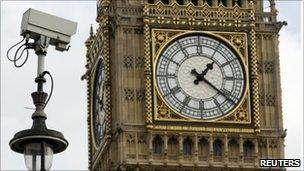What does the spending review mean for security policy?
- Published

The review hints at what lies in store for security planning
The Strategic Security and Defence Review has always been billed as something more than just another defence review.
In the run-up to its publication, officials have been emphasising that the aim was to look at national security in the round - examining Britain's place in the world and the opportunities and threats that presented themselves, and then looking at what capabilities would be required in response.
But just how security-minded has this approach been?
Inevitably the focus of attention has been on cuts to defence. But within the review are also significant pointers to the direction of overall security policy.
There is talk of focusing less on the "conventional" threats of the Cold War past and more on the "unconventional" threats of the future. In practice, that means that amidst all the cuts, cyber security is one domain set to grow.
There will be ВЈ650m of new investment over four years in a National Cyber Security Programme which will cover different departments.
There will also be a new UK Defence Cyber Operations Group to integrate cyber security within the Ministry of Defence.
"We will also work to develop, test and validate the use of cyber capabilities as a potentially more effective and affordable way of achieving our national security objectives," the review reads, which may well be taken as code for offensive as well as defensive cyber capabilities.
Terrorism, like cyber security, was identified as a "tier one" threat to the UK in the National Security Strategy.
And today it was made clear that counter-terrorism aspects of policing will be prioritised but within the context of wider "efficiency savings" involving reorganisation and police reform.
But as with other fields, the details - and the figures - are left unclear, with less detail than provided on defence equipment.
Energy security
Recent concerns over a Mumbai-style commando attack by al-Qaeda are also reflected in a specific mention of the need to "enhance the firearms capabilities of police armed response units this year and support their work with specialist military units" with more armed response vehicles and joint planning on how to evacuate casualties in the event of such an attack.
There are also plans to deploy more detection capabilities against "unconventional materials" - meaning radiological, chemical or biological weapons.
Incidents like the Mumbai attacks of 2008 make their impact on policy
In general there is also an emphasis on conflict prevention and supporting fragile states using a range of tools including diplomacy, aid and intelligence.
This has implications for the Department of International Development (DFID) and its spending.
The prime minister announced that the investment in aid for fragile and unstable countries would double by 2015 so that about a third of DFID's budget would be spent on conflict prevention.
There has long been an argument within government and outside about how far aid money should be used for poverty reduction and how far it should be used in pursuit of overall national security objectives.
Today's review indicates a shift towards the latter objective, although not an overwhelming one.
Amid fears of future vulnerabilities, there is also a focus on energy security which, we are told, will be given a higher priority in UK foreign policy.
Diplomatic relations with key supplier states will be given a stronger focus and companies working overseas in energy will be given more support.
There are no specific details of spending cuts for the UK intelligence agencies, although there is talk of increasing the pace of savings and reducing effort in some areas to focus on counter-terrorism, counter-proliferation and cyber security, as well as the forthcoming Olympics.
Other aspects of the review touch on areas already announced like the review of counter-terrorist legislation and establishment of a National Crime Agency.
- Published19 October 2010